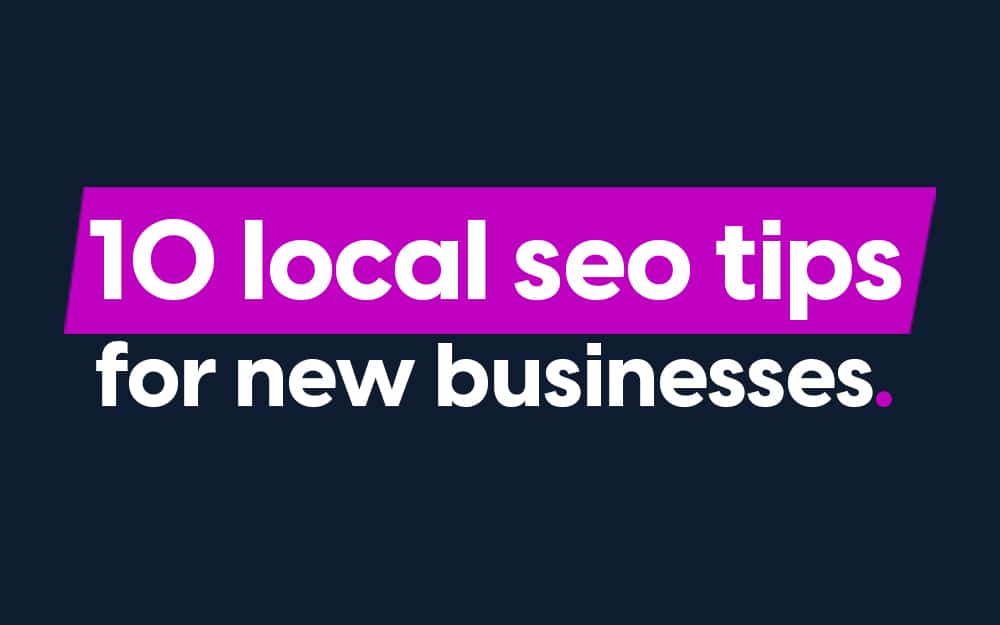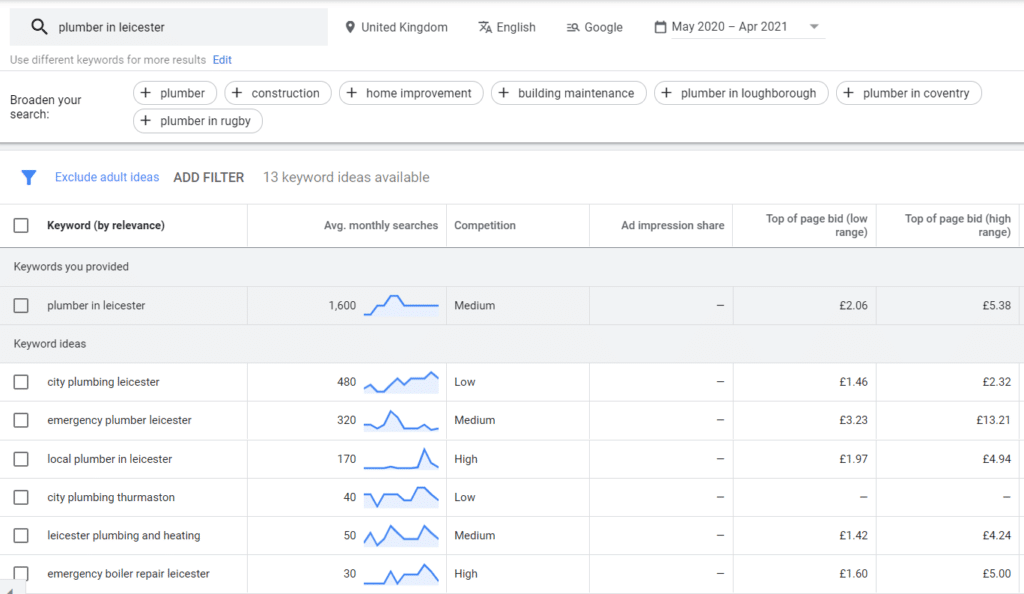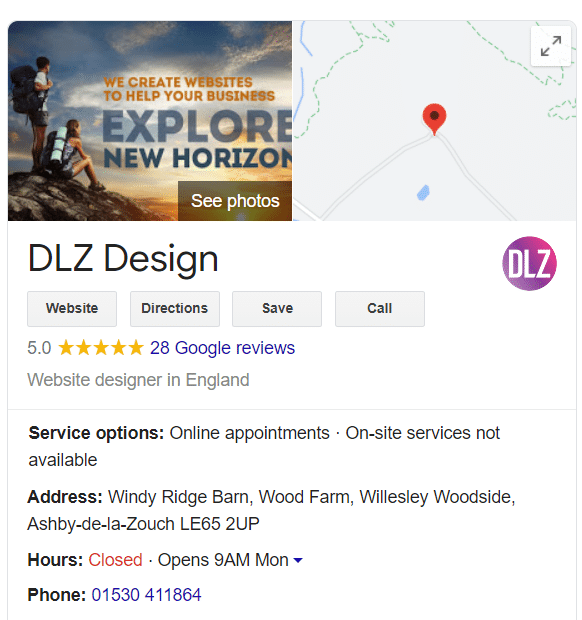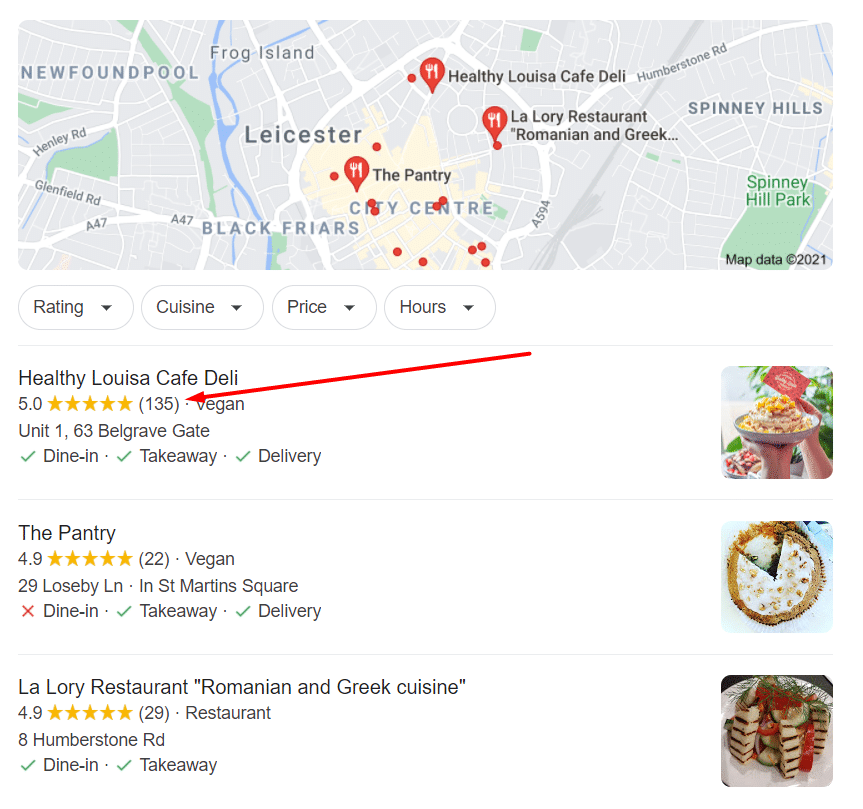
10 Local SEO Tips For Brand New Websites
It’s no secret that modern businesses can’t go without websites. After all, 81% of today’s consumers start their search for products and services online.
If you’re a new entrepreneur, you probably already have a website for your startup. But, we’re willing to bet that you’re behind on new business SEO.
You’re not alone — around 70% of small businesses don’t have an SEO strategy in place. However, if you want to succeed, you can’t afford to be a part of this statistic.
Luckily, you can get to work today thanks to this guide. We go over the importance of local SEO and 10 expert tips you can use on your brand-new website. Read on to start getting more traffic and building your brand as a whole.
Do you know why your website doesn’t perform? Let us audit your website, giving a report on how you can improve it. For Free!
Why Bother With Local SEO?
If you look at the scroll bar, you’ll notice that this local SEO guide is quite long. It’s only natural for you to wonder if it’s worth reading. We think so, and it’s not just because we wrote it.
There’s no doubt that local SEO can help your business succeed. Why? Well, let’s first consider the marketing efforts of big brands. National companies have virtually unlimited budgets to advertise to consumers across the country. They rely on brand recognition to appeal to a vast audience.
Now, consider your business. You’re a virtually unrecognizable startup with a small marketing budget. Due to these limitations, it isn’t easy to get lots of customers quickly.
That’s where local SEO comes in. Instead of competing with big brands for broad keywords, you narrow your scope. You optimise your site for local searches with the ultimate goal of putting your company in front of ready-to-buy consumers. These consumers will appreciate the unique, local-based value you bring and be willing to jump on board.
Now that you understand the power of local SEO, you’re probably eager to start tweaking your website. Here are our top 10 tips to keep in mind when working on your strategy.
1. Do Keyword Research
If you’re at all familiar with SEO, you know that keyword research is crucial. Keywords tell Google what your website is about, allowing Google to show your website to relevant users.
When you’re doing local SEO for your new startup, keyword research becomes essential. You need to figure out what keywords local customers are searching for. By using these terms and phrases throughout your website, Google will rank your content accordingly.
How to Conduct Keyword Research
Conducting keyword research for new business SEO can be a complicated process. Keep things simple by starting with Google’s Keyword Planner.

This powerful tool is straightforward to use. After creating an account, open up the planner and type in a few keywords that you think your customers may be searching. Then, view the most common local searches related to those keywords. You’ll know whether the keywords you chose are popular among local customers in seconds. You can also view other common related keywords that you can incorporate into your website.
Where to Put Your Keywords
Keywords are important, but you should avoid practices such as keyword stuffing. Google will catch these blackhat techniques and lower your site’s ranking in search results.
So, when it comes to keywords, don’t use them just for the sake of using them. Create informative, engaging content while naturally adding keywords. Successful new business SEO strategies will use keywords within their content, blog posts, etc.
You should also use them in your URLs, meta titles, meta descriptions, etc.
Most importantly, make sure that the content is providing value to the reader!
2. Emphasise Location
When implementing our first new business SEO tip, you will probably focus on finding keywords related to what your business offers. For instance, if you own a restaurant, you might focus on phrases like “Italian restaurants,” “restaurants near me,” “restaurants with happy hour,” etc.
However, you should also focus on keywords that reference the local area. So, if your restaurant is in Leicester, you’ll want to see what geographic-based keywords are popular (“Italian restaurant in Leicester,” “restaurants in Leicester,” etc.).
Once you know which locally relevant phrases your target audience is using, you can incorporate them into your content. Using the names of nearby areas and landmarks can also help Google rank your pages. Sticking with the example above, you might want to mention the Leicester Cathedral, the Curve Theatre, etc.
Create Unique Location Pages
If you’re a startup lucky enough to have multiple locations, or perhaps a service area business, you should create unique pages for each. These pages are ultra-specific and help your customers find the shop closest to them. On each page, include information such as the opening hours and contact information. You should also put information such as promotions, testimonials, parking details, etc. Additionally, be sure to attach a Google Maps widget to direct your customers to your store.
Create a Location-Specific About Page
While it’s possible to have multiple locations from the get-go, your startup probably operates out of a single store. In this case, you’ll want to create a location-specific About page. Talk about your experience working in the local area, what events/companies you partner with, how you participate in the community, etc.
3. Make Separate Pages For Your Products and Services
If you’re a startup with only one location, you might find it tempting to lump all of your products and services onto one page. It’s easier for you, and it might seem convenient for the customer.
However, this move is not a smart one when it comes to local SEO. Having all of your products and services on one page makes you seem like a jack-of-all-trades. Google tends to frown on these sites as they aren’t specific to a user’s search intentions. Plus it is more difficult to target a specific service or product with your content.
Instead, the search engine prefers pages that are dedicated to one product or service. Google will show these specific pages to users, ensuring they find exactly what they’re looking for. Having specific pages will also show Google that you are a reputable authority in your industry.
What to Include on Each Page
Let’s say you own a home clearance company. With this third new business SEO tip in mind, you should create unique pages for services such as rubbish clearance, home clearance, asbestos removal, etc.
On each page, you should describe how you can help users in the local area. Be clear about what you offer and what sets you apart from the competition. Additionally, each page should make it easy for customers to contact you (whether it be by phone, via an online contact form, etc.).
We understand that this can be a time-consuming practice. But, we assure you that Google will reward you for your efforts. As long as you use relevant keywords and local references, your content will become more rankable. Whatever you do, make sure that your content is unique across the board. Google frowns on duplicate copy (even when it’s on your own pages).
4. Capitalise on Local Events
When it comes to new business SEO, you can’t just cater to search engines. You must create content that is relevant and engaging to your target audience. This way, they will come to trust your brand and enlist your services.
One of the best ways to create engaging content is by capitalizing on local events. So, get into the habit of checking your area’s news sites every day. Be aware of what’s going on and what your customers care about.
Then, you can start creating content relevant to these local events. For instance, you could write a blog post about how your business responds to as event that affected the community. You could create a video about how your startup is supporting a local charity. Really, the possibilities are endless. But engaging with your local community is a great way to attract new customers and give something back!
The Perfect Way to Keep Creating Content
We’ve all heard that content is king. But, when we have a hard time coming up with topics, it can be hard to post relevant and valuable content consistently.
Luckily, when you start writing blogs based on local news, you’ll never run out of ideas. There will always be tons of events and news stories relevant to your business and target audience.
The Happy Accident of Catering to Search Engines
We know we said that you can’t just cater to search engines. But, when you write blogs based on your area’s news, you’ll be inadvertently practicing local SEO.
Google will be able to pick up on if you’re talking about local events. If it deems your content relevant to users, it will rank it accordingly (especially if you are timely about providing your business’s perspective on the event).
5. Optimise Your Google Listing
The techniques we discussed so far aren’t difficult, but they involve a little time and effort. If you’re looking for a super simple way to improve your new business SEO, you’re bound to appreciate our next tip.

This next tip — optimising your Google listing — couldn’t get any easier. Start by creating a Google My Business account, and fill out all of the information relevant to your startup. Google will take this information and automatically generate a Google listing for your business.
Tips For Optimising Your Listing
Ideally, your listing will show up in local search results, Google Maps, and the Google Search Knowledge Panel. But, if you want to outrank your competitors, you will need to optimise your listing.
Here are some tips:
- Verify ownership. Google won’t rank your business if it can’t confirm you’re the true owner. So, when you make your account, be sure to complete the verification process.
- Make sure all details are accurate. Log out of your account and search for your business to see a customer’s perspective. Confirm that there are no typos, your phone number is correct, etc.
- Keep information up-to-date. If your address or phone number changes, Google should be the first to know about it. Update your listing regularly, so customers have accurate information.
- Manage reviews. Ask your customers to leave reviews, and respond to them, thanking them for their feedback.
- Fill out everything. Don’t leave any blanks — be sure to fill out your hours of operation, product/service descriptions, acceptable payment methods, etc. Also, add your logo and lots of images.
6. Use Web Directories
Web directories are another way to boost your local SEO. Some people question whether they are valuable in today’s online world, but we can assure you that they are.
Having your listing on sites like Yell can have several benefits. For instance, it can be a way to build backlinks and have your NAP (name, address, and phone number) across many websites. These qualities have the potential to boost your standing with Google.
Which Web Directories Should You Choose?
There are tons of web directories you can use for local SEO. You’re probably familiar with common sites such as Yell and the Independent directory. However, it’s crucial to pick the right directories for your new business SEO strategy.
7. Optimise For Mobile Searches
According to one study, 81% of all web searches for goods and services in the UK come from mobile devices. That’s a lot of potential traffic that you want to capitalize on.
But, if you don’t optimise your site for mobile users, Google will be less likely to rank your pages. You need to make your mobile site just as user-friendly and search-engine friendly as it is on a desktop.
The process is all about creating a website that users will stay on and interact with. Some of the best tips include:
- Using large, legible fonts
- Ensure fast loading times
- Include call to action buttons in prominent positions on mobile
It’s best to design your site with mobile-friendliness in mind from the get-go. However, by making tweaks to an already-existing site, you can improve your Google ranking.
Once you make our recommended changes, test your site using this tool. You’ll know just how Google-friendly it is and recognize what you can improve on.
8. Optimise For Voice Searches
When Googling with their phones, many users type their queries directly into the search bar. However, thanks to voice-to-text functions, around 20% of mobile searches use voice search.
Optimising for mobile searches is a good start. But if you want to cover your bases, you must also optimise for voice searches.
The two are very different and require you to consider unique factors. In fact, most keyword planning tools are not optimised for mobile. So, what is a startup to do?
We recommend putting yourself in your customer’s shoes (or talk to real customers). Ask, “How would you conduct a voice search if you’re looking for [insert product/service here]?”
Consider your own answer and input from your customers. Typically, people tend to use very conversational queries when conducting voice searches. They avoid big words but aren’t afraid to use long sentences. You should also realize that they tend to ask questions.
Knowing these details, you can sprinkle in long-tail keywords and relevant questions throughout your content. Google will see that you’re addressing users’ queries and boost your ranking.
9. Obtain High-Quality Backlinks
A backlink is a link on another website that leads to your website. They may seem insignificant to someone with little local SEO knowledge, but they show Google that your site is reputable and worthy of a high ranking.
So, it’s in your best interest to build backlinks. As we mentioned earlier, web directories are one way to link your site to other pages. However, backlinks on directories don’t carry a lot of weight.
You will need to obtain more links on high-quality websites. It might be tempting to purchase backlinks, but as we’ve said, Google is hip to sketchy blackhat techniques. Instead, you should reach out to relevant websites in your industry, get in touch with local companies or influencers, etc. And, if you create excellent content on your own site, others will start linking to you without you having to ask.
10. Build Your Reviews
While all of our tips are equally important, this last one carries significant weight. Building your reviews is definitely one of the best ways to boost your new business SEO strategy.
Reviews show Google how customers actually feel about your business. If most of your reviews are positive, Google will be more likely to give you favorable rankings.

In addition to boosting your local SEO, reviews give your site credibility among new customers. Users tend to trust online reviews and use the opinions of others to decide whether they want to buy from you.
As a new startup, it can be hard to get the ball rolling. So, here are some of the best tips for getting reviews:
- Ask for reviews in response to customer compliments
- Send email requests after a customer makes a purchase
- Follow the guidelines of review sites (Google says it’s okay to solicit whereas Yelp discourages it)
As long as you provide excellent products and services, your reviews should be glowing. But, if you’re hit with a negative review, you should handle it to prevent it from affecting your ranking. Entrepreneurs may resolve issues by publicly replying to complaints, asking the site to remove the review, etc.
The Bottom Line — Don’t Overlook the Importance of Local SEO
As a startup, you can’t afford to overlook the importance of local SEO. These techniques are crucial in giving you the boost you need to build your brand and get customers. Without them, you’re bound to fall behind.
This guide to new business SEO should serve as a good starting point. The methods we discussed are relatively straightforward and easy to implement yourself. However, it is essential to have a quality website as a foundation. We offer web design in Leicester and throughout the UK.
If you need help or want to take your new business SEO strategy to the next level, you might want to reach out to DLZ to get a quote on our local SEO service today. Implementing these strategies on your own will only get you so far. An expert local SEO team knows what works and gets the job done fast.
